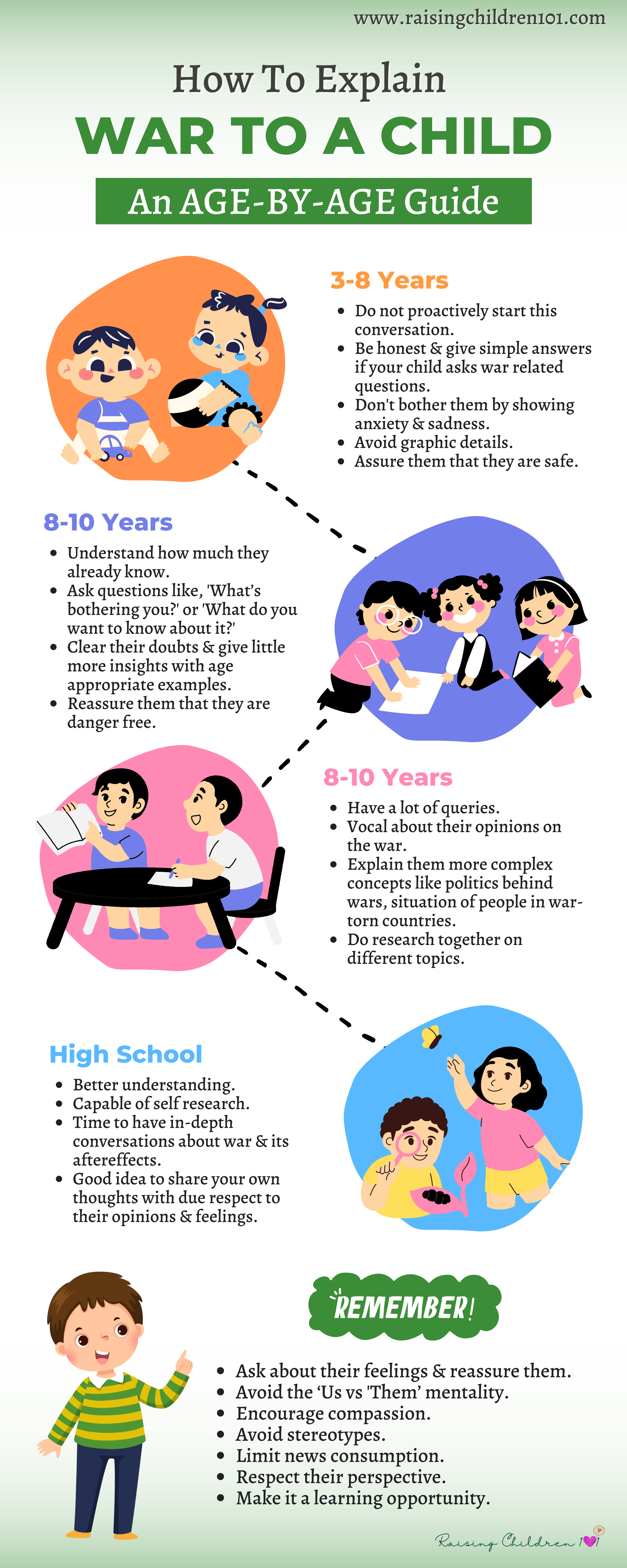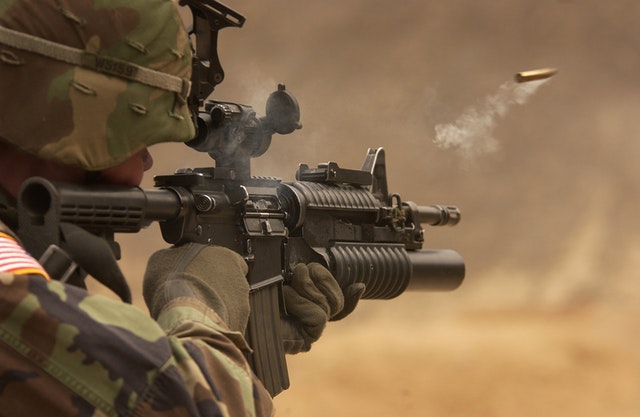Every day we turn on the news, there is some distressing news.
And recently we have been hearing about the war between Russia and Ukraine.
It’s stressful and overwhelming for us. But what about our kids?
War can be a tough concept for children to understand. It is often distressing and confusing and can leave lasting impressions.
Kids will have a hundred questions about it and a hundred emotions flooding their brains. So, it’s our duty to help them understand why and how wars happen.
The best way to explain war to a child is by breaking it down into age-appropriate pieces. This guide will help you do just that.
An Age-by-age Guide To Explain War To A Child
Age 3 – 8 years
You don’t have to proactively start a conversation about war with kids of this age.
If they aren’t exposed to war yet, well and good.
However, if your child asks questions or shows interest, be honest in your answers and try to keep them as simple as possible.
Remember, kids pick up on our emotions. So, if you are showing anxiety and sadness while talking about war, they will understand that it is something to be concerned about.
It’s important to avoid graphic details or images that could be disturbing. To them, the world is still rosy and safe.
Here are some things you can say:
– War is a fight between groups of people.
– People fight wars for many reasons, such as to protect their country or because they disagree with each other.
– War can be very dangerous and people can get hurt or killed.
– Sometimes people use special equipment, like guns and tanks, during the war.
What’s more important than these is to reassure your kids that they are safe. Tell them that the war is happening far from them, and they have nothing to fear.
Age 8 – 10 years
If your kid is a little over 8 years old and worries about the war, start by asking what they know.
This will help you understand how much they are exposed to and where their questions are coming from.
From there, you can provide more information as needed.
Further, you can ask them questions like, “What’s bothering you?” or “What do you want to know about it?” to understand what answers your kids are seeking and answer accordingly.
Kids this age can understand war better. So, you can give a little more details.
If they are playing video games related to war or have something related to it in books they read, use them as examples to make your point.
Again, it’s crucial to emphasize that your child is not in any danger.
Recommended reading: 12 Positive Parenting Strategies For Millennial Parents
Recommended reading: 7 Parenting Mistakes That Can Cause Childhood Trauma
Middle School
At this age, kids are likely to have a lot of questions and maybe be more vocal about their opinions on the war.
They’re also old enough to understand more complex concepts, such as the politics behind why wars are fought.
It’s okay to talk about these things in more detail with middle schoolers. Just remember to be respectful of their opinions, even if they differ from your own.
Step out of the political scene and talk about what common people go through during war too.
In case you don’t know the answers to their questions, say so and look for answers together. This can be a great opportunity for bonding.
High School
High schoolers are likely to have a pretty good understanding of war.
They may still have questions, but they’re also more capable of conducting their own research.
At this point, you can have more in-depth conversations about the causes and effects of war, different strategies used during wartime, and what life is like for people living in war-torn countries.
You can also share your own thoughts and feelings about war with high schoolers. Just be sure to respect their opinions, even if they don’t align with yours.
Things to Remember While Having a Conversation About War
Here are a few things you should keep in mind when you are talking about war to your kid, irrespective of their age.
1. Ask about their feelings and reassure them
Avoid toxic positivity. When you explain war to a child, it’s important to ask about their feelings and reassure them.
Let them know that it’s okay to feel scared or sad and that you’re there for them.
Reassuring your child will help them feel secure.
2. Avoid the ‘Us vs. Them’ mentality
Avoid using terms like “Good guys” and “Bad guys.” This can promote a black-and-white view of the world.
Us vs them mentality is the root cause of all major conflicts in the world. Avoid that at all costs and explain to your child that on either side of war are individuals just like us.
Even if you belong to or are a supporter of one side, try not to demonize the people on the other side. This only serves to further divide us and creates an “Us vs. Them” mentality.
3. Encourage compassion
Encourage your kids to have compassion for people affected by the war.
This includes civilians, soldiers, and anyone else who is struggling.
Teach them it’s important to be kind to everyone, even if they don’t agree with them.
4. Avoid stereotypes
When talking about people from different cultures, be careful not to use stereotypes.
For example, avoid saying things like “All Arabs are terrorists” or “All Americans are warmongers.” These statements are not only untrue but also harmful.
Instead, focus on the individual and emphasize that everyone is different.
5. Limit news consumption
If your kids are exposed to news about the war, limit their consumption.
Watch or read the news with them and discuss what they’re seeing and hearing. This will help them make sense of what’s going on and provide a context for the events they’re seeing.
And if you think the news is too graphic or disturbing for them, change the channel or turn it off altogether.
6. Respect their perspective
Even if you don’t agree with your child’s perspective on the war, it’s important to respect their opinion.
They may see things differently from you, and that’s okay. What matters is that you’re open to hearing what they have to say.
7. Make it a learning opportunity
Use this as an opportunity to teach your kids about different cultures, religions, and countries.
You can also teach them about important historical events and figures.
This will help them understand the world better and see that war is not the only thing that defines a culture or country.

Conclusion: Explain War To A Child
Every family is unique, and there is no one right way to explain war to a child.
The most important thing is, to be honest, respectful, and open to answering questions they may have. With that said, we hope this guide has been helpful in giving you a starting point.




